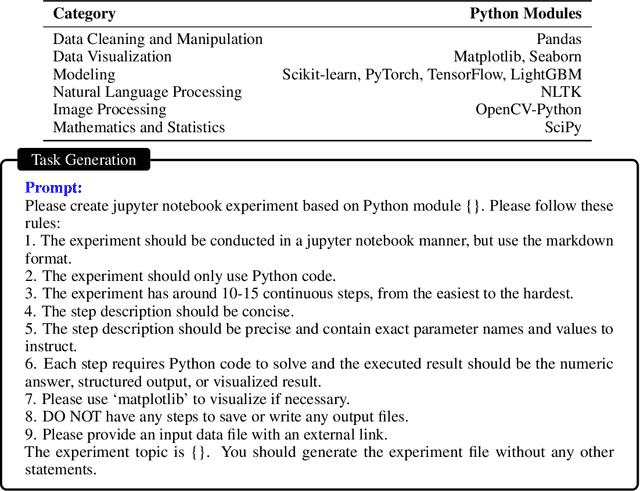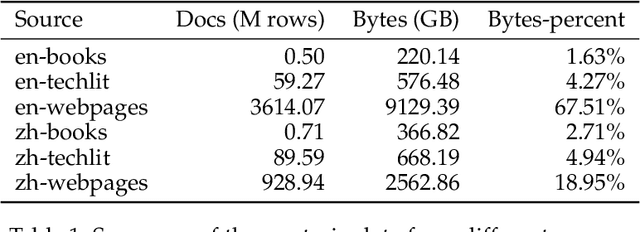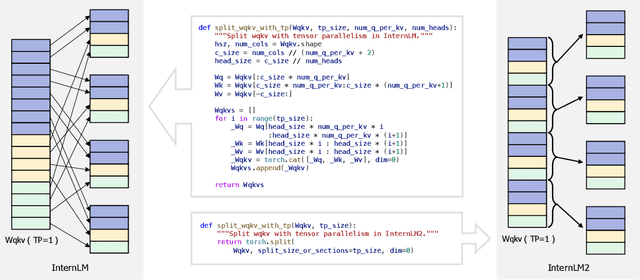Zerun Ma
MIG: Automatic Data Selection for Instruction Tuning by Maximizing Information Gain in Semantic Space
Apr 18, 2025Abstract:Data quality and diversity are key to the construction of effective instruction-tuning datasets. % With the increasing availability of open-source instruction-tuning datasets, it is advantageous to automatically select high-quality and diverse subsets from a vast amount of data. % Existing methods typically prioritize instance quality and use heuristic rules to maintain diversity. % However, this absence of a comprehensive view of the entire collection often leads to suboptimal results. % Moreover, heuristic rules generally focus on distance or clustering within the embedding space, which fails to accurately capture the intent of complex instructions in the semantic space. % To bridge this gap, we propose a unified method for quantifying the information content of datasets. This method models the semantic space by constructing a label graph and quantifies diversity based on the distribution of information within the graph. % Based on such a measurement, we further introduce an efficient sampling method that selects data samples iteratively to \textbf{M}aximize the \textbf{I}nformation \textbf{G}ain (MIG) in semantic space. % Experiments on various datasets and base models demonstrate that MIG consistently outperforms state-of-the-art methods. % Notably, the model fine-tuned with 5\% Tulu3 data sampled by MIG achieves comparable performance to the official SFT model trained on the full dataset, with improvements of +5.73\% on AlpacaEval and +6.89\% on Wildbench.
CIBench: Evaluating Your LLMs with a Code Interpreter Plugin
Jul 15, 2024



Abstract:While LLM-Based agents, which use external tools to solve complex problems, have made significant progress, benchmarking their ability is challenging, thereby hindering a clear understanding of their limitations. In this paper, we propose an interactive evaluation framework, named CIBench, to comprehensively assess LLMs' ability to utilize code interpreters for data science tasks. Our evaluation framework includes an evaluation dataset and two evaluation modes. The evaluation dataset is constructed using an LLM-human cooperative approach and simulates an authentic workflow by leveraging consecutive and interactive IPython sessions. The two evaluation modes assess LLMs' ability with and without human assistance. We conduct extensive experiments to analyze the ability of 24 LLMs on CIBench and provide valuable insights for future LLMs in code interpreter utilization.
GTA: A Benchmark for General Tool Agents
Jul 11, 2024



Abstract:Significant focus has been placed on integrating large language models (LLMs) with various tools in developing general-purpose agents. This poses a challenge to LLMs' tool-use capabilities. However, there are evident gaps between existing tool-use evaluations and real-world scenarios. Current evaluations often use AI-generated queries, single-step tasks, dummy tools, and text-only interactions, failing to reveal the agents' real-world problem-solving abilities effectively. To address this, we propose GTA, a benchmark for General Tool Agents, featuring three main aspects: (i) Real user queries: human-written queries with simple real-world objectives but implicit tool-use, requiring the LLM to reason the suitable tools and plan the solution steps. (ii) Real deployed tools: an evaluation platform equipped with tools across perception, operation, logic, and creativity categories to evaluate the agents' actual task execution performance. (iii) Real multimodal inputs: authentic image files, such as spatial scenes, web page screenshots, tables, code snippets, and printed/handwritten materials, used as the query contexts to align with real-world scenarios closely. We design 229 real-world tasks and executable tool chains to evaluate mainstream LLMs. Our findings show that real-world user queries are challenging for existing LLMs, with GPT-4 completing less than 50% of the tasks and most LLMs achieving below 25%. This evaluation reveals the bottlenecks in the tool-use capabilities of current LLMs in real-world scenarios, which provides future direction for advancing general-purpose tool agents. The code and dataset are available at https://github.com/open-compass/GTA.
InternLM2 Technical Report
Mar 26, 2024



Abstract:The evolution of Large Language Models (LLMs) like ChatGPT and GPT-4 has sparked discussions on the advent of Artificial General Intelligence (AGI). However, replicating such advancements in open-source models has been challenging. This paper introduces InternLM2, an open-source LLM that outperforms its predecessors in comprehensive evaluations across 6 dimensions and 30 benchmarks, long-context modeling, and open-ended subjective evaluations through innovative pre-training and optimization techniques. The pre-training process of InternLM2 is meticulously detailed, highlighting the preparation of diverse data types including text, code, and long-context data. InternLM2 efficiently captures long-term dependencies, initially trained on 4k tokens before advancing to 32k tokens in pre-training and fine-tuning stages, exhibiting remarkable performance on the 200k ``Needle-in-a-Haystack" test. InternLM2 is further aligned using Supervised Fine-Tuning (SFT) and a novel Conditional Online Reinforcement Learning from Human Feedback (COOL RLHF) strategy that addresses conflicting human preferences and reward hacking. By releasing InternLM2 models in different training stages and model sizes, we provide the community with insights into the model's evolution.
 Add to Chrome
Add to Chrome Add to Firefox
Add to Firefox Add to Edge
Add to Edge